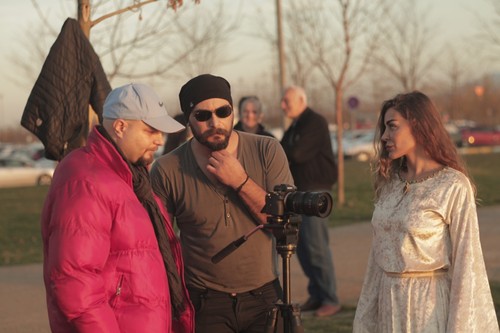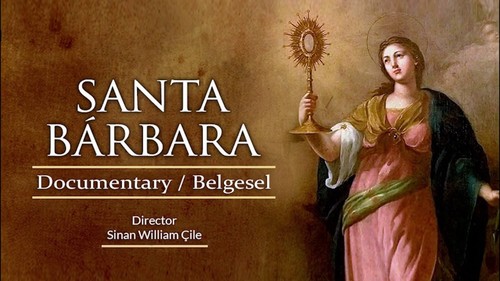© Turkuvaz Haberleşme ve Yayıncılık 2026
Santa Barbara, known in the Orthodox Church as the Greatest Martyr, was an early Christian Greek saint and martyr who lived during the third century. Known to have lived in the city of Nicomedia, present-day İzmit in Turkey, the life of Santa Barbara has become a part of international cultural heritage. CR Yapım, a production agency in İzmit, has started filming a documentary on the life of Santa Barbara. The documentary, directed by Sinan William Çile, will depict the sorrow of Santa Barbara's life and her willingness to stay true to her faith despite the fact that it cost her life.
Daily Sabah had the chance to interview producer Onur Azat Yılmaz and historian and art director Numan Gülşah about the upcoming documentary.
Daily Sabah: How did CR Yapım come up with the idea of filming a documentary about the life of Santa Barbara, which has become a part of international cultural heritage?
Yılmaz: Since 1994, research relating to Saint Barbara's past in İzmit has been conducted by many people and institutions. Mining engineer Kuddusi Şebapoğlu stated that while working in Germany he realized that Saint Barbara was remembered and recognized throughout the mines in Europe on Dec. 4, International Mining Day. As a result of his research, it was discovered and thus proven that the place of Barbara's death was ancient Nikomedia, known today as İzmit. In 1999, the Orthodox community performed a ritual on the Dec. 4 where her remains were found.
A year later, the 2000 patriarch's nuns held a ceremony at the spot where the remains were discovered. There are 45 cities in the world, thousands of settlements and 34 geographical areas where Catholics live. With this ceremony, the Orthodox community declared to the world that Saint Barbara was killed for the Catholic world. A large number of foreign TV channels shared the event as well.

Selin Irmak (r) plays Santa Barbara.
The birthplace of and the place Saint Barbara was killed is İzmit. We realized that so far no projects have been completed in her name and decided that by filming a documentary on her life and death in İzmit, we would be able to create a cultural bridge between both Turkey and İzmit and the whole Christian community.
D.S.: How did researching the life of Santa Barbara proceed before filming the documentary?
YILMAZ: At first, we decided to investigate the truth of the story of Santa Barbara and in this process, the information gathered based on the research of epigraphist, Christian clergymen and historian Numan Gülşah was compiled. Mr. Gülşah can give further details about the process.
NUMAN GÜLŞAH: I have studied historical books written all over the world related to the life of Saint Barbara and reached the conclusion that Saint Barbara was killed in Nicomedia. A book written by Erin Graffy De Garcia included details about where Saint Barbara was born, where she lived and was later killed at the age of 17 that pointed to Nicomedia. The evidence was approved by the Ecumenical Patriarch of Constantinople of the Eastern Orthodox Church Bartholomew I, who visited İzmit for the Saint Barbara ritual on Dec. 4, 2000. Speaking after the ceremony, the ecumenical patriarch explained the decision of the Orthodox world by stating that Saint Barbara died a religious martyr. In a situation that cannot fully be explained by historians and archaeologists, the explanation made by those on top is considered indisputable.

The documentary depicts the sorrow of Santa Barbara's life and her willingness to stay true to her faith despite the fact that it cost her life.
Santa Barbara, who is a significant figure in the Christian community, was born in present-day İzmit. How does this affect the cultural and historical heritage of Turkey?
The memorial ceremonies, which started in 1999, were not highly publicized. Participation increased when we started shooting the biographical documentary. We believe that by presenting Saint Barbara's life story to the whole world, we will create a cultural bridge and ultimately attract tourists to both Turkey and İzmit.
We are all familiar with the name Santa Barbara, but how did she become a Christian saint who has 45 cities named after her?
Nicomedia, present-day İzmit, is the city where the most Christians, Jews and Shamanists were killed. According to pagan beliefs, those who believed in one god or monotheism were attacked and condemned to die. Saint Barbara, who was a believer in Christianity, was thus condemned to death in Nicomedia by the court. Noble Christians were beheaded, and the other Roman citizens were killed by wild animals or gladiators. Saint Barbara's father, Dioscorus, was known as a very wealthy ship owner at that time and had arranged for his daughter to live in the governor's palace and in return had given tremendous financial aid to the governor of Rome.
When the Roman court made the final decision, Dioscorus was on the Mediterranean. Dioscorus was urged to convince his daughter to turn away from Christianity, but she refused. As a result, the high court's decision was fulfilled by Saint Barbara's father. It is said the moment Saint Barbara was decapitated, a bolt of lightning struck and killed Dioscorus.
A shepherd named Valentinuz took Barbara's body outside the city walls and years later it became a visiting area. Some 300 years later, Byzantine Emperor Justinian sent the remains of Saint Barbara to Istanbul in a crate. The remains, which were kept at Hagia Sophia, were then sent to the Vatican during the crusades. Later the remains, per order of the pope, traveled with those who went on a Christian pilgrimage to the open sea. The seamen were told to build a church when they set foot on land. Today, Santa Barbara has become the namesake of 45 cities, including Santa Barbara in California.
In İzmit, do people still hold ceremonies for Saint Barbara and do Turks embrace the saint like CR Yapım has done with the documentary as much as the Christian community?
Since 1999, commemorative ceremonies for Saint Barbara have been held annually by the Istanbul Phanar Patriarchate. The fact that these commemorate ceremonies held in İzmit are embraced demonstrates the acceptance of the truth that Saint Barbara actually lived in these lands. The mayor of İzmit, Nevzat Doğan, is currently making arrangements for memorial areas to promote İzmit's cultural and touristic value.
What is the projected release date of the documentary? Where can those interested be able to watch it?
YILMAZ:On Aug. 24, 2018 there will be a special preview before a gala at the Carnuntum in Austria. On Dec. 4, 2018 there will be a preview and gala event in Istanbul. We plan to show the documentary on many national channels along with international channels, including National Geographic.
Can we expect more projects about figures like Saint Barbara that have affected international cultural heritage from CR Yapım?
Our main aim is to uncover the history of the city we live in, İzmit. We have many upcoming projects that have begun as results of our research.
